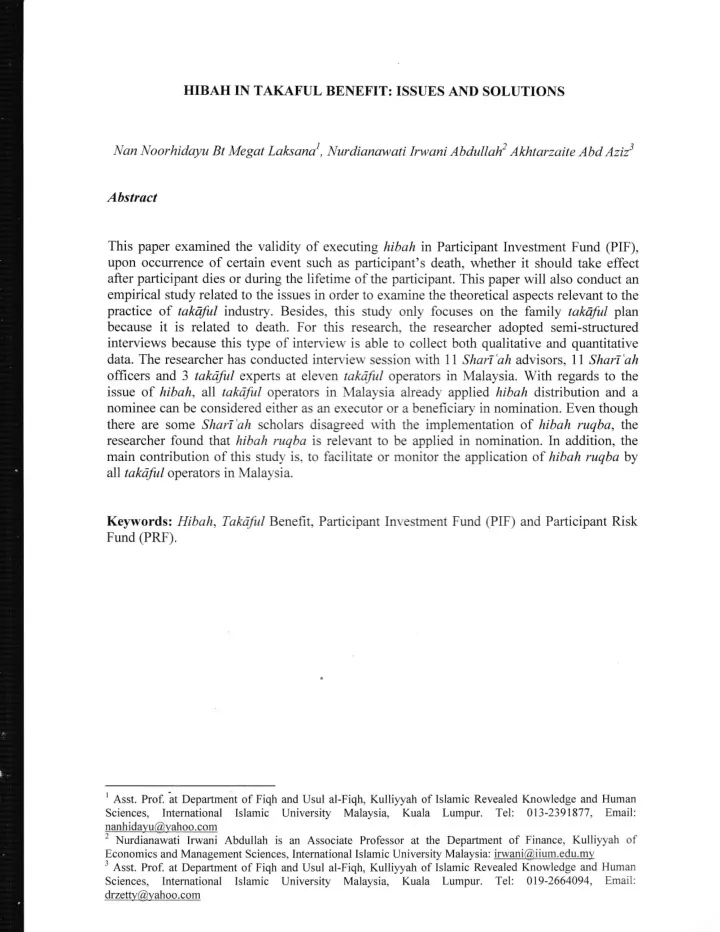

HIBAH IN TAKAFUL BENEFIT: ISSUES AND SOLUTIONS Nan Noorhidayu Bt Megat Laksanal, Nurdianawati lrwani Abdutlah2 Akhtarzaite Abd Aziz3 Abstract This paper examined the validity of executing hibah in Participant Investment Fund (PIF), upon occulrence of certain event such as participant's death, whether it should take effect after participant dies or during the lifetime of the participant. This paper will also conduct an empirical study related to the issues in order to examine the theoretical aspects relevant to the practice of mkaful industry. Besides, this study only focuses on the family takdful plut because it is related to death. For this research, the researcher adopted semi-structured interviews because this type of interview is able to collect both qualitative and quantitative data. The researcher has conducted interview session with I 7 Shar|'ah advisors, ll SharT'ah officers and 3 takaful experts at eleven talatful operators in Malaysia. With regards to the issue of hibah, all takaful operators in Malaysia already applied hibah distribution and a nominee can be considered either as an executor or a beneficiary in nomination. Even though there are some Shart'aft scholars disagreed with the implementation of hibah ruqba, the researcher found that hibah ruqba is relevant to be applied in nomination. In addition, the main contribution of this study is, to facilitate or monitor the application of hibah ruqba by all mkaful operators in Malaysia. Keywords: Hibah, Tahiful Benefit, Participant Investment Fund (PIF) and Participant Risk Fund (PM). I Asst. Prof. it Department of Fiqh and Usul al-Fiqh, Kulliyyah of Islamic Revealed Knowledge and Human Sciences, International Islamic University Malaysia, Kuala Lumpur. Tel: 013-2391877, Email: nanhidayu@yahoo.com ' Nurdianawati Irwani Abdullah is an Associate Professor at the Department of Finance, Kulliyyah of Economics and Management Sciences, International Islamic University Malaysia: irwani@iium.edu.m), ' Asst. Prof. at Department of Fiqh and Usul al-Fiqh, Kulliyyah of Islamic Revealed Knowledge and Human Sciences, International Islamic University Malaysia, Kuala Lumpur. Tel: 019-2664094, Email: drzettv@yahoo.com
Tmkmfe'sE Bem*fEts ira tF$A ZSt$ Distribution ot takufulbenefits after the death of %t , the participant can be known as nomination process. n iJ*erri pirti"ip** *r',0 has attained'\he age of il{}i tA$ sixieen yoars rfiay nominate an individual to f:*esiv$iifn&Sf{{iritieit$tit*,p+$,Eibhi,E$.d..nl Takfir{it ', .',.,,",ffi*.*,,* + t ffi :le#-d'.* *iC> *la pua#r W ffi rEx*niJl.,ry - il;;;;,-*-- PS0lH,*114t SSN The beneficiary of the participant will be paid through takSful benefits under 3 conditions which are..... 1 a death occurs to the participant 2 the bkaful glan matures (the period ol takdfut plan reaches its end) 3 participant ierminaie ihe plan before maturity period.
ffi ffiffiffiffiAffiffiffi ffiffi-Sffi#T$Wffiffi ', To examine the validity of executing hibah in PlF, upon occurrence of certain event such as the participant's death, whether it should take I i effect after the participant dies or during the lifetime of the padcipant. i ) * i lo recommend solutions in distribution of takaful benefits especially the 1":::::li'1! I.IT=RATURE REVIEW GiI HIBAH t&*.in. 4$: txe$igdp fte.BYr*x**F of.tE 6aft#r.d bs6 ad trle i!ils of lrEdt in lr*nirdaE{ q-lt q Hoqr'€f.9tj 2ffi) *s* TIF atqlst 6f rtcinirBiiot fi tatdil and' the i6lqe'wh*thsrprE{€if€ds {aE giE eay-::.,H€ft, .be.ryql::s. E:::lf,i Ah Btrien lsmajl., 20Og) . . ?01sj E&miflq lhe status of lmires far Mu6lim parilcipant€ and nmMusllm participards ariC to ffies how Far ihe related @n@pt af hibah lo tle nominatiff r i1r ;l.amiy.: !ii*!Iuf pmcdpd::by, iNurdimawati lMani et al.,2O1O\ ?6{3: "...the eflect ot nomiEtion as an exrutor q, as a beneficiary under conditiodal.r,r$af,. (SchedrrelB;' P,ara 3(1), rFSA.ols)
w rersffi&ffi*ffi r#ETH*$*L*GY
w Fs&sffiEF8ffiffi ;itri#r.:...t lilr \ .,_,iuri,, {Ili i ll I ii!,$a}l*l :E:1 lGiti i:}1 1 }{tt}iilF$ii}1{}t i i i i s:*t I I i{a$j1 I }{rr{ti:t{ii liJ:tF,}.i] i :a; ijta+iaii : i{}J i r t ? i il Xli lSi I I lirb i ?*.itti-1t!iE! I 1ii-*E*i::;{.: lilir! ? r{irItkrlr : I l+ I{_.i{t I !.ili l tEil.i; t tB: !:r.i*F:i 3;l: Fl l{rilrl:,, l: i*:i 1t:1lr'-.11 & AruetY$E$ #F Tffiffi [NT#ffivlEWEffi$
r &" Fi*dir: gs-H==*=-eh ==bjectiv* ffi.*g*ar*i: *bj*etive- To examrne the validity of executing hibah in PlF, whether it should take effect after the oarticipant dies or during the lifetime of the par'ticipant ., n ij.ir;::ii:i;:,
li.Y{4i#-"' Reason fon the findings &l:,4qil {'tS78}, fdanafi and Sfiafie; }#hen a ds*or dies at tfr'le time of giving iribah to the r**ceiver, the contract of fti&afi Es considered vcid.
"ffi9mru#LLJsg*ru Nan Noorhidayu Megat Laksana Lecturer (ASSISTANT PROFESSOR) (I IUM/IRK/FIQH&USUL AL-FIQH) E- ma i I : *agh$eE!-#liqg{&"eduJgy Mobile: 013-2391877
ffi^ *-YrmmBrye&$ruS wf €h* ffiuxm#m g n wM&B$RkgF* w ffil ffi.t "#wmershEp *f the Funds
ffi ME*KGR*U*}D *F ?hEE SYU*Y A family iakaful plan is a long term sarring and investment instrument which provide a financial benefits in the eveni of tragedy to the participant A participani who enters into family takaful contracts will be grouped together with other participants who " share the same risks with him/her such as death or total permanent disabilitY A participant will pay the contribution and will credited into separate accounts which are Participant lnvestment Fund (PlF) and Farti*ip*nt Rls$c FuBxd {FHF}
Recommend
More recommend